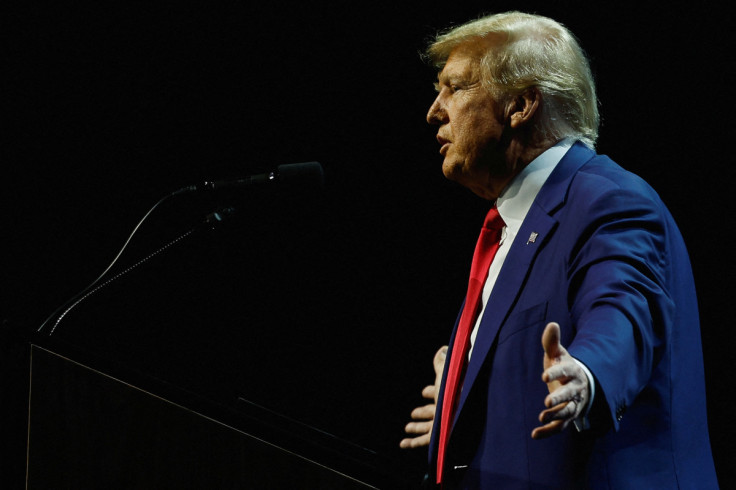Evangelicals, Who Helped Trump Win In 2016, 'Divided Or Tense' Over Legal Issues
KEY POINTS
- A prominent evangelical leader said he believes the question on character will linger as 2024 looms
- A jury had earlier found Trump liable for sexual abuse and defamation
- Some observers said Trump's recent legal battles may not affect his 2024 campaign much
Evangelical congregations are either "divided or tense" over the piling up of legal allegations against Donald Trump, who is reportedly leading the 2024 Republican presidential primary, a prominent evangelical leader said.
"Almost every congregation that I know is either divided or tense about these sorts of political controversies coming out of the Trump years. Almost every family that I know has people who don't speak to each other anymore about this personality and this figure," Russell Moore, editor in chief of Christianity Today and ex-president of the Ethics & Religious Liberty Commission, told NBC's "Meet the Press" on Sunday.
Moore was asked whether there was still a "divide" among evangelical congregations over the "morality" issues Trump was facing recently.
"What's primarily shocking is the fact that here were are in a week where a former president of the United States is found liable for sexual abuse and sexual assault and defamation of a woman who survived such abuse and assault, and the country just yawns for the most part," he said.
WATCH: @drmoore says dismissing Trump's sexual abuse verdict has "devastating implications."
— Meet the Press (@MeetThePress) May 14, 2023
"Think about the teenage girl in a church somewhere who's being abused by her youth pastor. ... She hears not only that, but when the victim is ridiculed ... the response is laughter." pic.twitter.com/Cqmo49KLDb
Trump was found liable by a federal jury for sexually abusing and defaming writer E. Jean Carroll earlier this month. It was the first time the former president was made accountable for sexual misconduct allegations even as multiple similar claims were made against him over the past years.
"I think there are a lot of people, including conservative Evangelicals like me, who are looking at this and saying, 'Are we really going to do this again? Haven't we seen this already? Do we really want to repeat it?' And I suppose that will be the question for the rest of the year," Moore explained.
When asked about what he would like to see in other potential GOP candidates, Moore said he believes someone should come forward to talk about "the importance of character" and trust.
He also said whoever steps up should also be able to discuss what the American children "are seeing and potentially will replicate."
Moore, however, pointed out that there was "fear" among candidates and even church officials. He said people who should be laying out the case of character and morality were afraid to speak about such matters due to the stakes being "too high."
Asked if there was "any circumstance" he would support Trump in 2024, Moore said, "I'll let my never [be] never."
Moore isn't the only one who thinks there is a division among evangelical communities regarding a Trump 2024 run.
"A lot of people are hoping it's Donald Trump and a lot are hoping it's somebody else. I think it's split right now," said Michigan Evangelical pastor Bill Bolin.
Evangelicals played a key role in delivering the victory for Trump in 2016, Time reported. During the 2016 election, evangelicals accounted for a record 26% of the total electorate and 80% of white born-again voters chose Trump.
In 2020, the think tank Pew Research Center found that most white Americans who regularly attended church voted for Trump.
Earlier this year, Trump criticized the "disloyalty" of evangelical leaders who he said did not show public support for his 2024 campaign, reported CNN.
Reacting to the former president's comments against religious leaders, Ralph Reed, executive director of the Faith & Freedom Coalition, said there was "no path to the nomination without winning the evangelical vote," adding that Trump knows this better than anyone as "he won their support in 2016."
Moore's comments came after a recent poll suggested Trump still had the majority of support from Christian evangelicals over another potential GOP nominee, Ron DeSantis.
A person close to Trump's 2024 presidential bid told Axios in April that the legal battles hounding the ex-president were not a negative aspect of the campaign. "Our voters hate the system," so Trump's March indictment in Manhattan "now just seems so much more important as it sends the signal to our voters that the system doesn't want Trump," the person said.
Trump spoke about Carroll's sexual allegations against him during last week's CNN town hall. He said he didn't know Carroll and never met her, calling the columnist a "whack job."
The legal issues over the sexual abuse allegations against Trump may not have a major impact on the 2024 campaign, some observers noted. "Americans have never looked to Trump as an exemplar when it comes to the treatment of women," wrote Time Magazine's Philip Elliott.

© Copyright IBTimes 2025. All rights reserved.






















